Inside Leeds's first CBD cafe where even the fry-up is infused with CBD oil


Inside Leeds’ first CBD oil cafe where even the fry up is infused with the cannabidiol
Leeds first CBD cafe has opened its doors offering food and drink infused with the cannabis plant derivative.
Advertisement
Hide AdAdvertisement
Hide AdTucked away on an industrial estate in Kirkstall, a former electrician and former builder have set up the business and say they hope to change people’s perceptions of CBD oil.
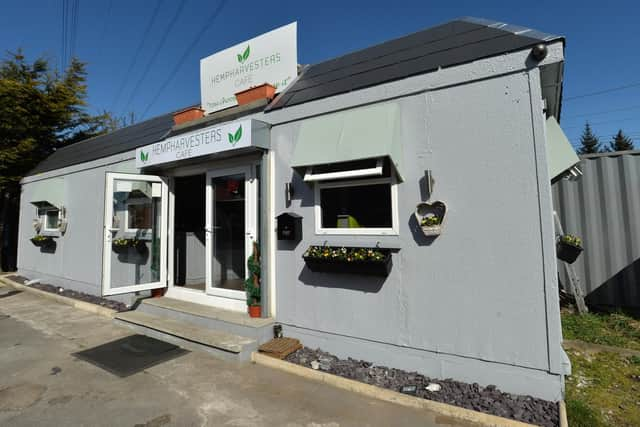

In recent years, CBD oil has been gaining in popularity. And notoriety. Not least because it is derived from the cannabis family of plants.
We’ve had a look around the new CBD cafe to see what all the fuss is about.
First impressions
Philip Shaw and David Cummings have opened what they claim is Leeds’s first CBD oil cafe. Hemp Harvester Cafe is in the most unlikely of places, too, part way down an industrial estate off Wyther Lane in Kirkstall.
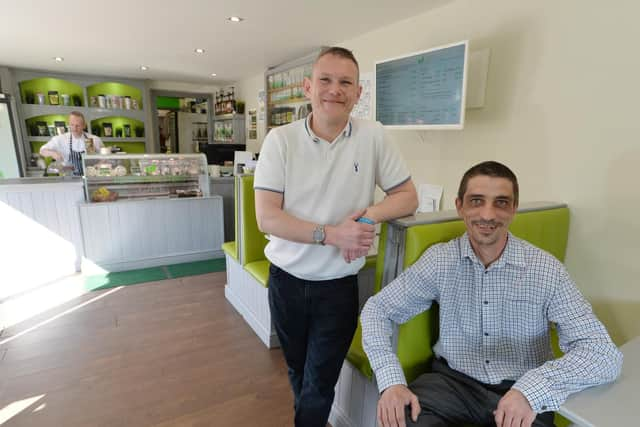

Advertisement
Hide AdAdvertisement
Hide AdFrom the outside it looks like any other cafe. There’s a scatter of tables outside, flower pots and a billboard advertising ‘fish n chips’. But stencilled above the door is the slogan ‘you choose it, we infuse it’, a nifty rhyme which sums up their raison d’etre.
Owner Philip, a former electrician, explains: “We are the first CBD cafe in Leeds, we are here to help everyone who wants to learn about CBD. Everything on our menu can be infused with CBD, which is why we have the slogan, ‘You choose it, we infuse it.’”
However, the pair are clear that this is not a cannabis cafe, not somewhere to come and get ‘high’.
David, a former builder and partner in the business, says: “We don’t want to attract the wrong people, we don’t want people looking for a high, because they won’t get that here. CBD is strictly a food supplement with a wide range of health benefits.”
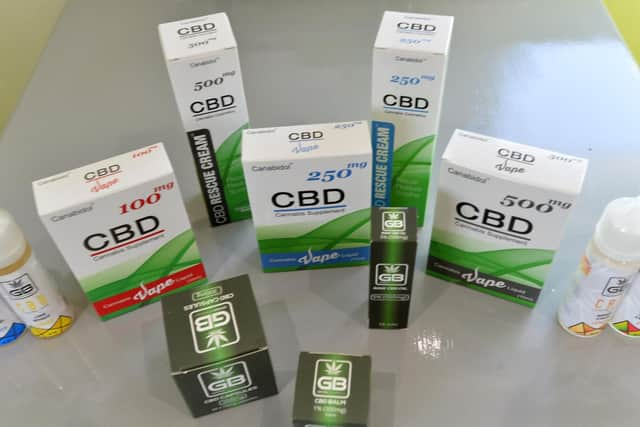

So what is CBD oil?
Advertisement
Hide AdAdvertisement
Hide AdCannabis oil and CBD oil are not the same. The former, contains a compound known as cannabidiol and tetrahydrocannabinol (or THC) - are you keeping up? - which is the psychoactive chemical found in ‘weed’, commonly associated with ‘getting high’.
It is classed as a medicine and must be prescribed by a medical professional. CBD oil on the other hand does contain CBD but it only has trace elements of THC (the bit that gets you high). For years, it has been sold as a ‘food supplement’. Of late, though, it has gained traction, in part because of its association with medical cannabis.
What are the benefits of CBD oil?
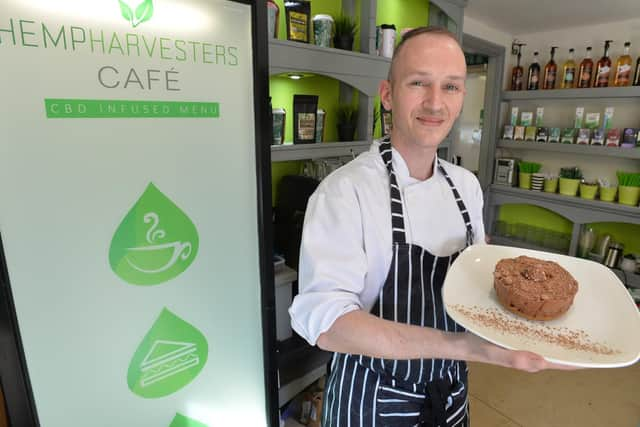

Evidedce is mainly anecdotal at this stage. David cites his own example: two compressed vertebrae following an accident two years ago, which left him in severe pain. He sought help through the usual channels and was prescribed pain relief drugs by his GP but adds they had a detrimental effect on his mental health, including mood swings. “Since I’ve been taking CBD oil, I’ve had none of that,” he says.
Lianne Cooper, 30, from Horsforth, works at the cafe. Her daughter, Faith, eight, suffers from a rare condition known as dopa responsive dystonia, which causes muscle contractions and Lianne claims CBD oil supplements help ease her condition.
Advertisement
Hide AdAdvertisement
Hide AdAlthough the jury is still out, there is mounting evidence that CBD oil can and does have a number of beneficial qualities, in terms of reducing stress, pain relief and even helping people sleep better.
So what’s on the menu? What does CBD oil taste like?
Normal food, which can be infused with CBD oil if requested. That extends to everything on the menu, from coffees, teas and smoothies to full English breakfasts and even cheesecakes.
The only thing is… the taste. CBD oil has a distinctive, earthy, bitter flavour. You can taste it in the coffee and while not unpleasant, it’s still there. However, chef Chris Cummings (brother to David), who began his career at Shibden Mill Inn, is enthusiastic about being the city’s first CBD chef.
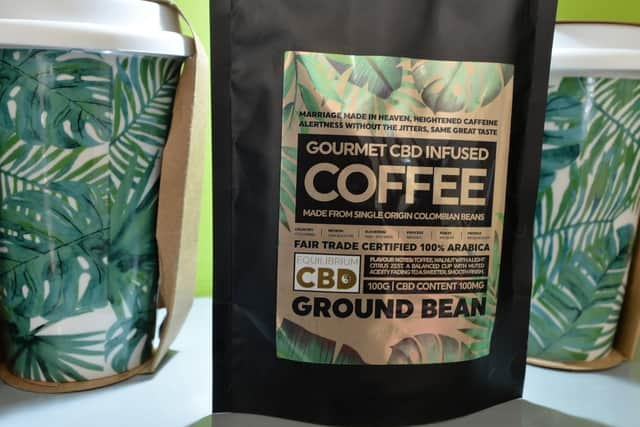

He says: “The taste of raw CBD is quite earthy, if you don’t like it, that’s where I come in. I’m working on all kinds of recipes, jams, drinks, chocolates and sauces. We’ve even got a full English and we can infuse the whole thing.”
Advertisement
Hide AdAdvertisement
Hide AdIn addition to its menu, Hemp Harvester Cafe also sells CBD oil in capsules and drop form.
Philip adds: “At the moment, because the law has not caught up, there’s a lot of confusion over labelling and so on, so it’s easy to be confused. What we are hoping is that people will be able to come to us, that we can be a point of contact, advising on which products are the genuine article in terms of CBD oil.”
What do experts say about CBD oil?
The Medicines and Healthcare products Regulatory Agency, an arm’s length body reporting to the Department for Health which is charged with regulating medicines, told the YEP that CBD oil was not considered a psychoactive substance and was therefore not controlled, so long as it was sold only as a food supplement.
Dame Sally Davies, England’s Chief Medical Officer, maintains there is currently insufficient evidence to prove cannabis medicine is both effective and safe, urging that until widespread trials had been completed medicinal cannabis should only be prescribed as a last resort.
Advertisement
Hide AdAdvertisement
Hide AdPrecisely where that leaves CBD oil is unclear. It falls outside the ‘medicinal cannabis’ label, because it contains only trace elements of THC, generally less than 0.2 per cent.
A Forbes report in 2016 estimated the global CBD market was worth around $200m but suggested it could blossom to a staggering $2.1bn by 2020.
CBD products were recently been added to the EU’s Novel Food Catalogue, which means they must be authorised before being placed on the market.
A Food Standards Agency spokesperson said: “New foods have to be authorised before they can be sold unless there is evidence they have a history of consumption before May 1997.
Advertisement
Hide AdAdvertisement
Hide Ad“Food businesses have not shown evidence of this for CBD products and CBD is therefore now considered a novel food in the European Union.
“The FSA is committed to finding a proportionate way forward by working with local authorities, businesses and consumers and to clarify how this applies to individual products.”